On the final day of his two-day visit to India's financial capital, Congress vice president Rahul Gandhi tried to connect with Mumbaikars by raising the issue of high electricity bills during his padyatra from National College in Mumbai's suburban Bandra to Dharavi, Asia's largest slum colony. Prasanna D Zore / Rediff.com reports.
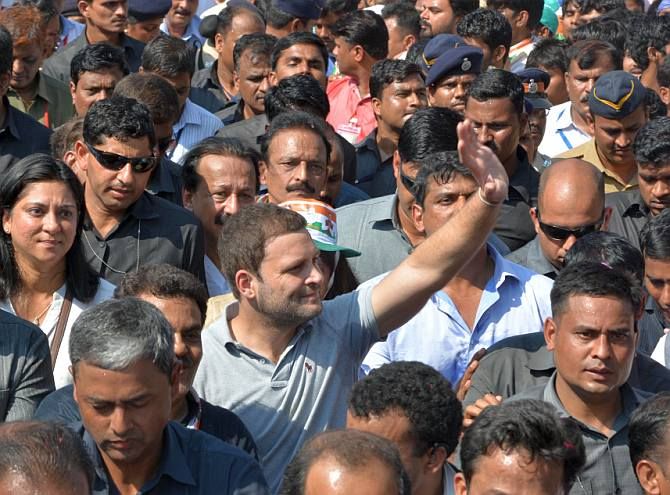
The 45-year-old Congress vice president sweated it out as he almost jogged the five-km distance of his padyatra (foot march) in Mumbai on Saturday, even as the mid-January sun beat down mercilessly.
Rahul Gandhi had three stopovers -- Bombay and Bandra Bakar Kasai Jamat Trust School in Bandra, Xavier's College in Mahim, and a meeting of local small and medium entrepreneurs at Dharavi -- before his march ended at the 90-feet road in Dharavi.
Dressed smartly in a T-shirt and denims, the Congress-president-in-waiting was ringfenced by Congress leaders Priya Dutt, Kripashankar Singh, Baba Siddique and Mumbai Regional Congress Committee president and Sanjay Nirupam, who all looked quite exhausted as they tried to keep pace with a fit Congress scion.
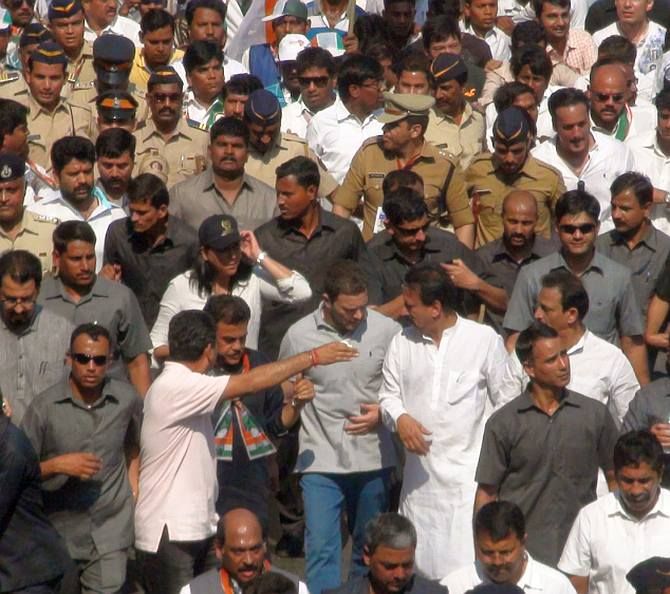
The Congress politicians were surrounded by the Special Protection Group commandos, who formed a chain around Gandhi, which then had the Mumbai police providing the outer ring.
******
Meera Nori, a Mumbai district Congress general secretary, gasped for her breath as she too tried to follow Gandhi, in vain.
She energetically matched step-for-step with the Congress leaders, albeit at a distance, from National College till the Bandra railway station when she slowed down as the procession moved ahead at a brisk pace.
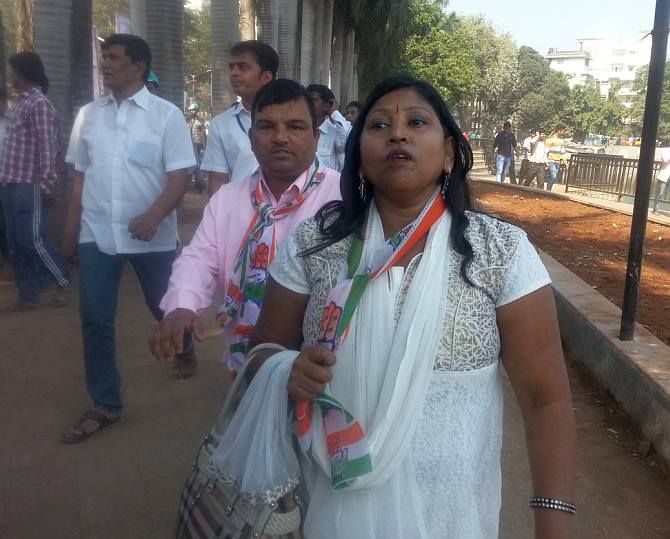
"Someone has to raise the issues affecting the common people," Nori said, as she walked at a brisk pace to keep up with Gandhi's padyatra.
Nori informs that the Congress vice president will not only put pressure on the BJP-led Maharashtra government to reduce electricity tariffs, but also ask the state government to stop the harassment of auto rickshaw drivers at the hands of the traffic police.
"While just one padyatra may not be enough to awaken the state government from its slumber, at least we have to make a beginning and get the voices of those unheard heard," she exclaims.
******
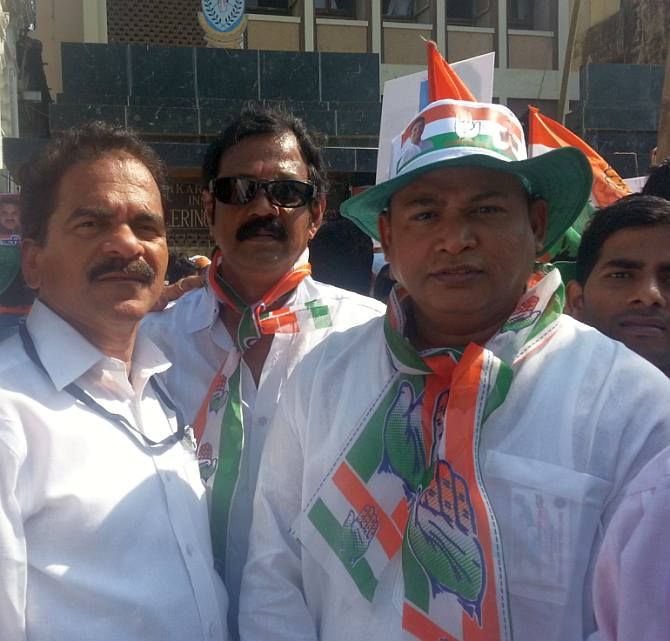
Arun Sawant, state Congress spokesperson, had been standing outside the Bombay and Bandra Bakar Kasai Jamat Trust School; he rebuked one of his supporters who asked him if he could board the bus from there till Dharavi.
"This is a padyatra and let us go on foot," he told his supporters, adding, "After all, Rahulji is fighting for Mumbai's citizens and we should wholeheartedly support him in his cause."
When asked about the inconvenience faced by the general public because of Gandhi's padyatra -- an ambulance passed by just then wailing loudly to get the traffic ahead get cleared -- Sawant said: "We sincerely apologise to the people of Mumbai. But we have to face some difficulties if we want somebody to articulate and fight for our just rights."
Sawant compared Rahul's padyatras -- the Congress vice president had done similar exercises in Telangana and Tamil Nadu last year -- to those of Mahatma Gandhi and asserts that such mass mobilisation was necessary not just to expose the wrongs of the state government but fight for popular causes.
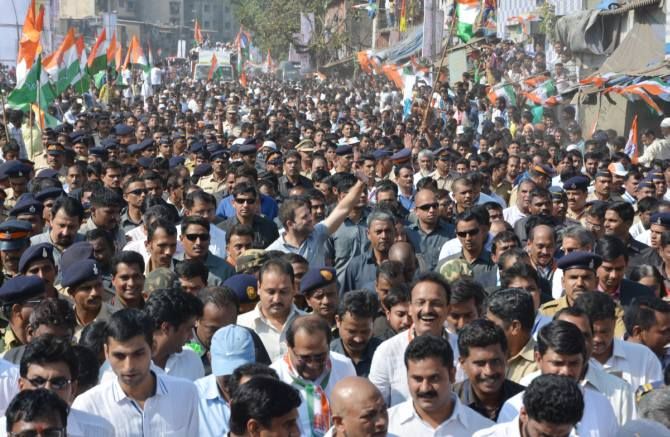
"Rahul Gandhi is only walking in Gandhiji's footsteps by voicing people's demands through such padyatras," Sawant said. He says that not only ordinary citizens, but the industries in Maharashtra too are reeling under high electricity charges and moving out to states like Gujarat.
******
As Gandhi walks out of the Bandra school, Congress supporters shouted 'Rahul Gandhi zindabad' and 'Rahul Gandhi aagey badho, hum tumhare saath hai' as he continued on his padyatra to Xavier's College in Mahim, his next stop where he addressed a small gathering of party workers.
Naeem Khan, an auto rickshaw driver from Bandra, was inside the school hearing Gandhi and gave Rediff.com an account of his 25-minute speech and discussion with about 25-30 drivers.
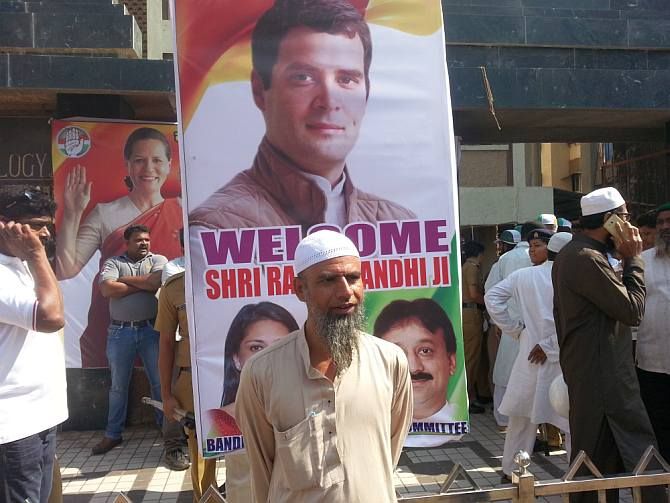
Khan, who met Gandhi, told him about the harassment they face from traffic police while plying their trade and also from officers of the Regional Transport Office when they go there to renew their permits, and apply for fresh badges.
"There was corruption in the RTO even when the Congress ruled the state. But it has increased manifold now," he told Gandhi.
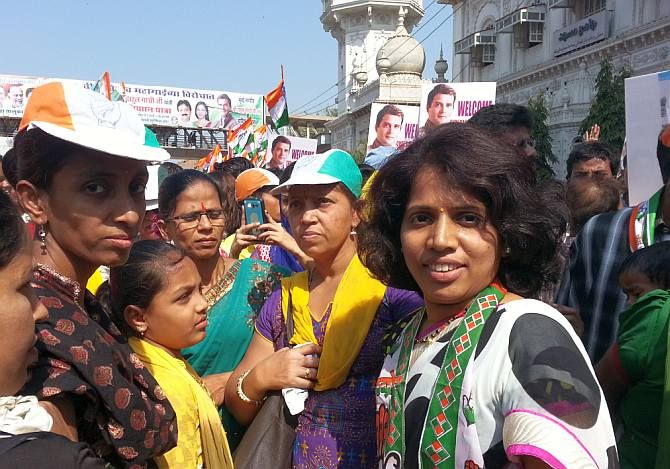
"He listened patiently to us and promised us that the state and Mumbai Congress officials will raise this issue with the government soon. He spoke for 15 minutes and spoke to some dozens of drivers after that, trying to get a first hand report on the harassment faced by us," Khan said.
******
At Xavier's College, Gandhi spoke for about 10 minutes. A college staffer, wanting to stay anonymous, said the Congress vice president not only talked about the farmer suicides in Maharashtra but also gave solutions as to how such suicides could be stopped.
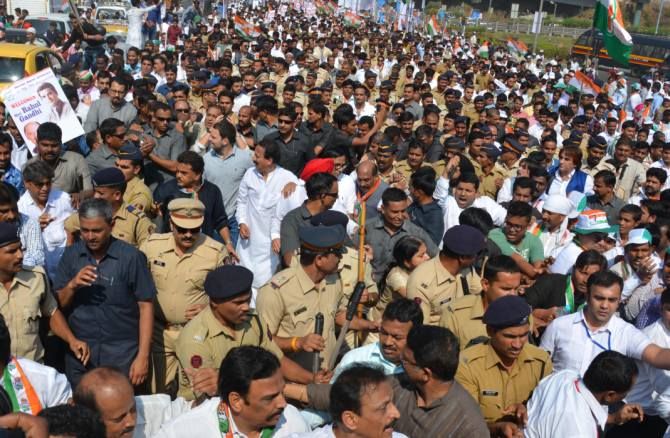
"He told us about a village in Madhya Pradesh, which was under severe drought for three years. When it rained there, the local people along with Rajendra Singh, a water conservationist, built weirs and small dams that has helped them tackle shortage of water for years to come."
The college staffer said the Congress had taken all the permissions for holding this meeting in the campus.
"We work on the third Saturday of the month, but the college management announced a holiday today when a request was made to us a month in advance. Instead, we will be working next Saturday, which is a holiday," he said.
It is here that we met Sunil Salunke, a final year engineering student, who cheered Rahul Gandhi and in turn was allowed to click a selfie with him.
******
When Rahul Gandhi reached the outer edges of Dharavi, it was almost 2 pm. Here, he addressed a group of Small and Medium Enterprise owners, who told him about the problems they were facing in carrying on with their businesses in Dharavi.
Asia's largest slum houses thousands of SMEs and cottage industries that together turn over a business of anywhere between $650 and $1 billion annually.
The slum colony also houses hundreds of small units that treat raw leather into finished goods and which have suffered a huge dent after the Maharashtra government imposed a ban on beef last year.
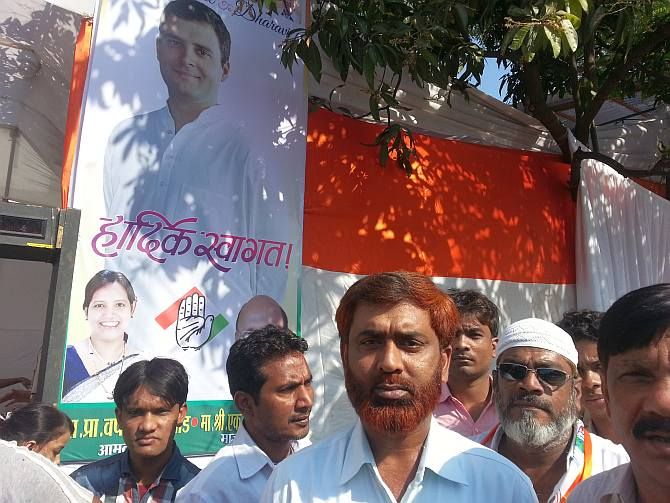
"The SMEs are the real employment-creators in India, not the big industries," Gandhi said in his address to the gathering here.
"Instead of facilitating the growth of SMEs, the Modi government is busy dishing out one fancy scheme after another," Gandhi said, taking a dig at his favourite political punching bag.
Gandhi also assured the SMEs that his party would put pressure on the state government to get electricity tariffs reduced.
"Before this government came to power we used to pay Rs 12 per unit for electricity. Today, we are paying anywhere between Rs 14 and Rs 16 per unit for the same," says Asif Jamal, a member of Dharavi Businessmen Welfare Association.
Anil Sahdev, a leather trader, lamented that his business had suffered hugely since the Maharashtra government banned beef last year.
"I have fired almost 80 per cent of the staff because leather is in short supply. What can I say but appeal to the state government to revoke the ban on beef," he says.










